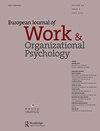Can task changes affect job satisfaction through qualitative job insecurity and skill development?
IF 3.4
2区 心理学
Q2 MANAGEMENT
European Journal of Work and Organizational Psychology
Pub Date : 2023-04-12
DOI:10.1080/1359432X.2023.2189104
引用次数: 1
Abstract
ABSTRACT This multi-wave study uses the Transactional Model of Stress and Coping (TMSC) to investigate whether employees may view task changes as an organizational event that stimulates skill development or engenders job risks (i.e., qualitative job insecurity) and thereby affect employee job satisfaction. Additionally, drawing on Regulatory Focus Theory (RFT), the indirect effect of task changes on job satisfaction through these two mediators was theorized to depend on individual’s regulatory focus (i.e., prevention or promotion). Mediation effects from task changes to job satisfaction via skill development and qualitative job insecurity were tested at the within-person level, while the moderating role by regulatory focus at the between-person level was tested using cross-level interactions. Results supported most of our hypotheses and also offered some unexpected insights. Task changes increased perceptions of qualitative job insecurity, which subsequently decreased job satisfaction. Although task changes did not show a significant direct link with skill development, skill development did positively predict job satisfaction six months later. We found no moderated mediation effects, however our moderator directly influenced job insecurity and skill development. Overall, the current study contributes to science and practice by providing valuable insights into the stressful processes that can evolve from task changes.任务变化是否会通过定性的工作不安全感和技能发展影响工作满意度?
摘要:这项多波研究使用压力和应对的交易模型(TMSC)来调查员工是否会将任务变化视为刺激技能发展或产生工作风险(即定性的工作不安全感)从而影响员工工作满意度的组织事件。此外,根据监管焦点理论(RFT),任务变化通过这两个中介对工作满意度的间接影响被认为取决于个人的监管焦点(即预防或晋升)。通过技能发展和定性工作不安全感,从任务变化到工作满意度的中介效应在人内层面进行了测试,而通过跨层面互动,通过监管重点在人与人之间层面的调节作用进行了测试。结果支持了我们的大多数假设,也提供了一些意想不到的见解。任务的改变增加了人们对工作质量不安全感的看法,从而降低了工作满意度。尽管任务变化与技能发展没有显著的直接联系,但技能发展确实对六个月后的工作满意度有正向预测作用。我们没有发现中介效应,但我们的中介直接影响了工作不安全感和技能发展。总的来说,目前的研究为科学和实践做出了贡献,为任务变化带来的压力过程提供了有价值的见解。
本文章由计算机程序翻译,如有差异,请以英文原文为准。
求助全文
约1分钟内获得全文
求助全文
来源期刊
CiteScore
8.00
自引率
2.30%
发文量
40
期刊介绍:
The mission of the European Journal of Work and Organizational Psychology is to promote and support the development of Work and Organizational Psychology by publishing high-quality scientific articles that improve our understanding of phenomena occurring in work and organizational settings. The journal publishes empirical, theoretical, methodological, and review articles that are relevant to real-world situations. The journal has a world-wide authorship, readership and editorial board. Submissions from all around the world are invited.

 求助内容:
求助内容: 应助结果提醒方式:
应助结果提醒方式:


